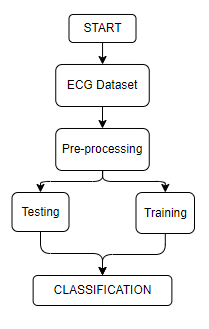Detection of Cardiovascular Diseases in ECG Images using Machine Learning and Deep Learning Methods
Objective
The objective of using deep learning for the classification of cardiovascular diseases in ECG images is to create a reliable and precise system that can automatically detect various cardiac conditions and anomalies from ECG signal representations presented as images. Firstly, it enables the early detection of cardiovascular diseases, a vital aspect of timely intervention and treatment. Deep learning models can identify subtle patterns and irregularities in ECG images that may elude human observation. Additionally, automating ECG classification reduces the likelihood of diagnostic errors, which can occur due to the intricate nature of cardiac signals. The use of deep learning also enhances speed and efficiency in the healthcare sector, as these models can swiftly process ECG images, potentially shortening wait times for patients and ensuring faster diagnoses.
Abstract
Cardiovascular diseases (CVDs) continue to be a leading cause of mortality worldwide, necessitating early and accurate detection for effective intervention. Electrocardiogram (ECG) images provide valuable diagnostic information, but the complexity and variability of ECG patterns present challenges for automated detection. This study proposes a novel approach for the detection of CVDs using deep learning methods, specifically MobileNet and EfficientNetV2, applied to ECG image analysis.
MobileNet and EfficientNetV2 are chosen for their efficiency and scalability, making them suitable for resource-constrained environments and large-scale datasets. The methodology involves preprocessing of ECG images, including noise reduction and feature extraction. These processed images are then fed into the deep learning models for classification of CVDs. The models are trained on a diverse and comprehensive dataset comprising ECG images with annotated cardiovascular disease labels.
The results of this study demonstrate the effectiveness of MobileNet and EfficientNetV2 in detecting CVDs from ECG images. The deep learning models achieve high accuracy, sensitivity, and specificity, showcasing their potential for clinical applications. The proposed approach offers a non-invasive and automated solution for early CVD detection, enabling timely medical intervention and reducing the burden of cardiovascular diseases on healthcare systems.
Keywords: Cardiovascular diseases, ECG images, Deep learning, MobileNet, EfficientNetV2, Deep Learning, Image Processing.
NOTE: Without the concern of our team, please don't submit to the college. This Abstract varies based on student requirements.
Block Diagram

Specifications
Hardware Requirements
Processor - I3/Intel Processor
Hard Disk - 160GB
Key Board - Standard Windows Keyboard
Mouse - Two or Three Button Mouse
Monitor - SVGA
RAM - 8GB
Software Requirements:
Operating System : Windows 7/8/10
Server side Script : HTML, CSS, Bootstrap & JS
Programming Language : Python
Libraries : Flask, Pandas, Mysql.connector, Os, Smtplib, Numpy
IDE/Workbench : PyCharm
Technology : Python 3.6+
Server Deployment : Xampp Server
Database : MySQL



 Paper Publishing
Paper Publishing
